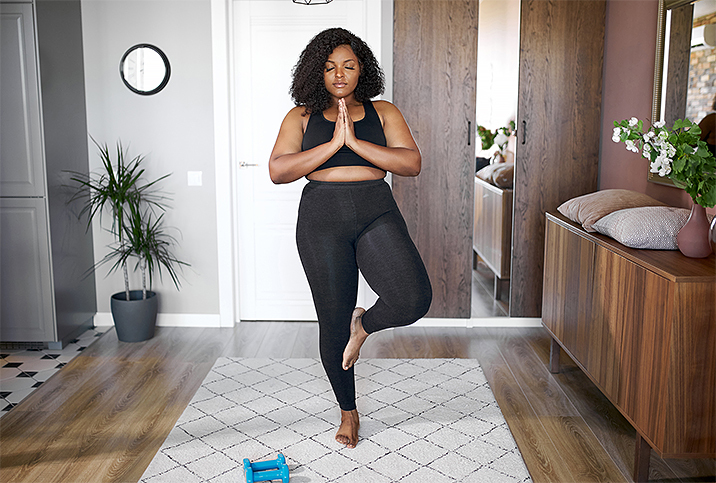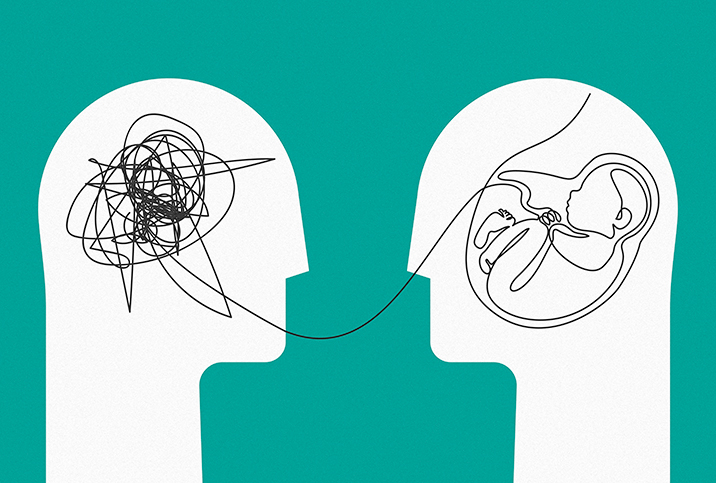Let's Not Forget to Talk About Postpartum Anxiety

The fear of being labeled a bad mother, selfish or crazy discourages many women from seeking help for mental health in time. Lack of knowledge about perinatal mental health disorders is another barrier in society. In recent years, postpartum depression has received a lot of media coverage, which is great because it raises awareness, but other disorders remain largely unnamed.
"When it comes to perinatal mood disorders, we often hear about postpartum depression but rarely do we talk about postpartum anxiety. However, it's a lot more common than we think. In fact, 10 percent of postpartum women will develop postpartum anxiety," said Sandra Konja, Psy.D., a licensed clinical psychologist and maternal mental health specialist based in San Diego.
Just because it's less known doesn't make it any less important. Postpartum anxiety is as common as postpartum depression, so it should not be ignored, because not getting treatment in time can affect both mother and baby.
"If left untreated, postpartum anxiety can negatively affect the bond between the mother and the baby. In addition, postpartum anxiety has been associated with impaired child social-emotional development," said Annette Attolini-Fertuck, Ph.D., a licensed clinical psychologist and perinatal mental health specialist based in New York City.
How to recognize postpartum anxiety
Postpartum anxiety presents as a constant state of worry, where the fear is often irrational and related to the concern of hurting or not taking proper care of the newborn.
"Postpartum anxiety is when an anxiety disorder occurs during the first 12 months after giving birth. It is different from postpartum depression, which is caused by depressive disorders," said Kristin Yeung Lasseter, M.D., a board-certified psychiatrist and the founder and president of Reproductive Psychiatry & Counseling of Austin, Texas. She specializes in reproductive psychiatry and women's mental health.
In many cases, if a woman expresses her concern, her close circle of family and friends may downplay its importance; after all, everyone thinks motherhood has challenges. Likewise, postpartum anxiety is often mistaken for depression because some people have limited information on the subject.
Postpartum anxiety doesn't usually manifest as symptoms of depression, although the two can occur together, Lasseter explained. Depression is associated with sadness and low mood, while postpartum anxiety symptoms include excessive worrying, difficulty relaxing and feeling keyed up or on edge.
Mothers with anxiety disorders often have difficulty sleeping, meaning they are unable to rest when the baby sleeps. Worries don't let the mind rest, either, with racing thoughts, panic attacks and intrusive images of bad things happening to the baby or doing bad things to the baby, Lasseter explained.
What causes postpartum anxiety?
Women with a personal or family history of an anxiety disorder are at high risk for postpartum anxiety.
"Postpartum anxiety can be caused by general anxiety, trauma, perfectionism, social anxiety, panic disorder or OCD [obsessive-compulsive disorder], among others," Lasseter said.
Mothers who have a history of emotions related to worry, especially during previous pregnancies, or a history of miscarriage, stillbirth or a thyroid imbalance are generally susceptible to postpartum anxiety, too.
"Additionally, having inadequate social support, experiencing financial stress, being a teen parent or a mother of multiples can also be risk factors," Konja said.
What are the main symptoms?
All parents can experience worries, with anxiety being a natural response when we feel threatened, in this case, related to protecting the baby. However, when the fear is persistent, the intrusive thoughts don't go away and the concern consumes daily life, we are talking about postpartum anxiety.
Attolini-Fertuck listed some of the symptoms a woman with postpartum anxiety may experience:
Physical symptoms
- Difficulty sleeping (usually falling asleep or staying asleep)
- Nausea
- Dizziness
- Muscle tension
- Increased heart rate
- Chest pain
- Trouble sitting still
Behavioral symptoms
- Checking things repeatedly
- Avoiding certain activities
Emotional symptoms
- Constant worry
- Inability to keep calm
- Fear of going crazy
- Cannot turn your mind off
- Scary thoughts about harm coming to your baby
- Fear of leaving the house with your baby by yourself
- Feeling on edge
- Irrational fears about things that are unlikely to happen
What can a woman with postpartum anxiety do?
Every woman wants to imagine a lovely motherhood with a healthy baby and the energy to face all the changes, however, not everything has to be perfect during maternity. Many women experience mood swings and concerns, but when the symptoms become acute, they can be overwhelming, disrupting family life and preventing the mother from enjoying this stage with her baby.
"Research shows that parents with anxiety are less likely to engage with their newborns throughout their first year of life, which could result in sleeping and developmental challenges," Konja said. "Children and teenagers of parents with anxiety are more likely to develop anxiety, attention, learning or behavioral difficulties as they grow older."
If you or someone you know is experiencing symptoms of postpartum anxiety, it is essential to seek help. Konja warned that without prompt and appropriate treatment, it is likely to become a long-term condition for the individual. Lasseter added that postpartum anxiety can have significant effects on the developing infant and the family unit as a whole.
"With the right treatment, a mother suffering from postpartum anxiety will get better in time," Attolini-Fertuck said.


















